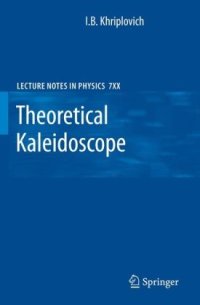
Ebook: Theoretical Kaleidoscope
Author: I. B. Khriplovich (auth.)
- Genre: Physics
- Tags: Quantum Physics, Physics general, Elementary Particles Quantum Field Theory, Theoretical Mathematical and Computational Physics, Nuclear Physics Heavy Ions Hadrons
- Series: Lecture Notes in Physics 747
- Year: 2008
- Publisher: Springer-Verlag New York
- City: New York
- Edition: 1
- Language: English
- pdf
According to Newton, "In studies of science, examples are more useful than rules."
With Theoretical Kaleidoscope, by Iosif Khriplovich, many concrete problems in classical mechanics, classical electrodynamics, quantum mechanics, and relativistic quantum mechanics are solved. This book is not a systematic course on theoretical physics. Rather, it uses intuitive, qualitative arguments to solve selected problems of this remarkable science.
The book is based on lectures given by the author over many years. The main source of problems addressed in the book are taken from the author's own investigations, as well as discussions with colleagues and students. With this book, the author hopes readers will be able to see the examples and engage in thoughtful discussions and arguments of their own.
Topics discussed in this book include:
- classical mechanics
- wave phenomena
- atomic physics
- semiclassical approximation in complex plane
- quantum electrodynamics
Theoretical Kaleidoscope is intended for students and physicists, both theoretical and experimentalist, and those who will appreciate seeing theoretical physics through innovative qualitative analysis.
This book is based on material taught in general and special theoretical physics courses given by I.B. Khriplovich at the Physics Department of Novosibirsk University, Russia. It is assumed that the reader is acquainted with fundamentals of classical mechanics, classical electrodynamics, quantum mechanics, and (in the last chapter only) relativistic quantum mechanics. These fundamentals are not discussed explicitly but instead demonstrate, by solving concrete problems, how they work in practice. Indeed, according to Newton, "in studies of science, examples are more useful than rules. To the best of Khriplovich's knowledge, most of these problems have never been discussed in textbooks, and it is believed that this is certainly true for the solutions presented. In all the text's discussions, reliance is on intuitive, qualitative arguments, the only exception in this respect being Chapter 4 which contains a consistent presentation of the semiclassical approximation in complex plane.